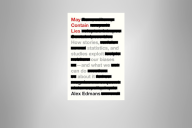You have /5 articles left.
Sign up for a free account or log in.
Reconstructing Democracy: How Citizens Are Building From the Ground Up by Charles Taylor, Patrizia Nanz and Madeleine Beaubien Taylor was published by Harvard University Press in March; it has elicited very little comment in the meantime. Admittedly, the spring just behind us proved not a very opportune moment to celebrate the socially and politically restorative powers of face-to-face community. But given a certain nagging dissatisfaction with what passes for democracy in 21st-century America -- the sense of it as the periodic rotation of pigs at a trough -- this little book serves as a reminder of what’s missing from public life.
At the top of the list of co-authors is Taylor, a professor emeritus of philosophy at McGill University, while Nanz is professor of transformative sustainability studies at the University of Potsdam and Beaubien Taylor has taught with the Committee on Degrees in Social Studies at Harvard University. Taylor is one of a handful of contemporary North American philosophers to have an international audience beyond his own discipline. And while Reconstructing Democracy is a fairly minor addition to his body of work as a whole, it represents a collaboration with two figures from the world of the policy sciences that is of a piece with his active role in Canadian political life. (He once lost a parliamentary race to Pierre Trudeau.)
In assessing the malaise of liberal-democratic societies, the authors present a familiar list of symptoms: cynicism, xenophobia, demagoguery, withdrawal into enclaves of the like-minded. And the diagnosis on offer here is indistinguishable from what can be found in hundreds, by now perhaps thousands, of other recent books: “Both democratic politics and various aspects of everyday life have been subjugated to the managerial logic of corporations and banks,” the authors write. (The songwriter James McMurtry put the same thought more vividly in a song, “We Can’t Make It Here,” recorded 15 years ago.) And so the impact of growing economic inequality goes unmitigated, while politics becomes a narrowly defined debate over a diminishing range of options.
Is the process bound to continue, like a dilapidated building collapsing on itself? Could it be reversible? Reconstructing Democracy strikes a note of provisional and qualified optimism, focused very much at the local level. While the problems are systemic, much of the damage is experienced at the level of the community. When jobs are exported or automated out of existence, whole patterns of life (e.g., neighborhoods, local governments, friendship networks, mutual support systems) fray or disintegrate. People’s “capacity to self-organize and to develop new ideas to move forward” goes into a death spiral.
“For democracy to really work,” argue Taylor et al., “there has to be a continued connection between [representative] institutions and the goals and requirements of citizens.” But “the political inefficacy of the communities feeds back and reinforces the original erosion of the local political community. This results in a fundamental decline in voters’ understanding of the mechanisms of change, of how they might collectively take their fate into their own hands …”
In their longest chapter, the authors recount a number of initiatives in Europe and North America suggesting that the vicious cycle can be broken. The capacity of a community to deliberate over its problems and develop options can regenerate -- albeit not quite spontaneously. One example will suffice here: a county in Wisconsin that was gutted by paper-mill layoffs in the early years of this century and given insufficient news coverage by the area’s media. A “local community foundation with a mission to model participatory approaches to place-based developments” organized focus groups to identify the needs of the community, setting in motion a series of developments that included a local workforce training program and a renovation of the abandoned newspaper building into a space that will have public meeting rooms, a microbrewery and a combination of solar panels and energy-efficiency features.
As indicated, a “local community foundation” was catalytic in starting the ball rolling. Later a firm from Louisiana was hired “to facilitate [the] protracted, resident-centered process” and “to infuse reliable information into decisions that required a level of technical knowledge that local residents didn’t have.” Similar arrangements were involved in other initiatives described in the book.
The authors’ emphasis throughout is on “self-organizing at the level of the community,” sometimes in the form of citizens’ assemblies or other “dialogue-based, participatory modes of consultation that accompany and inform the more traditional processes of representative democracy.” But with any role at all for expertise in public life now squarely in the crosshairs of populist suspicion, the relationship between participatory democracy and technocratic consultancy is bound to be a vexed question. Perhaps it is something best taken up in a book of its own. For now, Reconstructing Democracy does an interesting job of putting it on the agenda.








